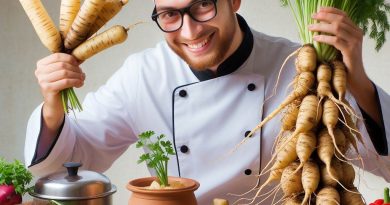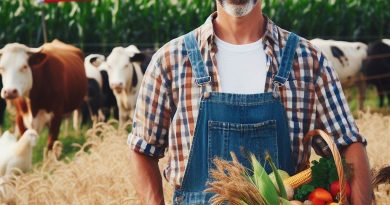Heirloom vs Hybrid Produce
Last Updated on March 2, 2024
Introduction
In the world of fruits and vegetables, there are two important categories to consider: heirloom and hybrid produce.
Understanding the differences and choosing between them can have a significant impact on our health, the environment, and even the future of agriculture.
Heirloom produce refers to varieties of plants that have been passed down through generations, typically for over 50 years.
These seeds are open-pollinated, meaning they are pollinated naturally by wind, insects, or birds.
This results in plants with unique traits, flavors, and appearances, often reflecting the rich history of agricultural practices.
Heirloom produce is treasured for its exceptional taste, diversity, and the preservation of genetic diversity.
On the other hand, hybrid produce is created by crossing two selected parent plants, combining desired traits.
This controlled breeding process results in plants that exhibit specific traits such as disease resistance, improved yield, or longer shelf life.
Hybrid produce dominates the modern market due to its uniformity, increased productivity, and ability to withstand transportation.
Choosing between heirloom and hybrid produce is more than just a matter of personal preference.
It affects the biodiversity of our food system, the quality of our meals, and the overall sustainability of agriculture.
By opting for heirloom varieties, we support the preservation of endangered plant species, local farmers, and their traditional growing practices.
Additionally, heirlooms often have superior flavor profiles, offering a more authentic and satisfying culinary experience.
Generally, making an informed decision about the produce we consume is essential.
Selecting heirloom varieties is a conscious choice that supports historical heritage, promotes agricultural diversity, and allows us to fully savor the flavors of nature.
Next time you’re at the market, remember the power of your choice and opt for heirloom produce, making a difference one bite at a time.
Definition of Heirloom Produce
What heirloom produce is
Heirloom produce refers to fruits and vegetables that have been passed down through generations of gardeners and farmers.
These unique varieties are open-pollinated and have a rich history.
The characteristics of heirloom varieties
Heirloom varieties are known for their distinct flavor, vibrant colors, and diverse shapes and sizes.
They are often more visually appealing than their hybrid counterparts.
Examples of popular heirloom produce varieties
- Brandywine Tomato: This large, beefsteak tomato is renowned for its exceptional taste and pinkish-red hue.
- Cherokee Purple Tomato: With its deep, dusky purple color and sweet, smoky flavor, this tomato is a favorite among heirloom enthusiasts.
- Moon and Stars Watermelon: This unique watermelon variety has dark green skin speckled with yellow spots, resembling a starry night sky.
- Lemon Cucumber: Resembling a lemon in shape and size, this cucumber has a mild, slightly sweet flavor.
- Costoluto Genovese Tomato: This Italian heirloom tomato has a ridged, fluted shape and is ideal for slicing or making sauces.
- Glass Gem Corn: Each kernel of this corn variety is a different color, creating a stunning display reminiscent of stained glass.
- Green Zebra Tomato: This small, tangy tomato features a distinctive striped pattern with shades of green and yellow.
- Scarlet Nantes Carrot: Known for its vibrant orange color and sweet taste, this heirloom carrot is a staple in many gardens.
- Purple Dragon Carrot: This carrot variety has a deep purple exterior and an orange interior, providing a striking contrast.
- Black Beauty Eggplant: With its shiny, dark purple skin, this heirloom eggplant adds a dramatic flair to any dish.
Heirloom produce holds a special place in the hearts of gardeners and farmers alike.
These varieties are not only flavorful but also have historical significance.
By cultivating heirloom produce, we preserve biodiversity and honor our agricultural heritage.
Read: Austin’s Must-Visit Farm-to-Table Spots
Definition of Hybrid Produce
What hybrid produce is
Hybrid produce refers to fruit or vegetables that are created by cross-breeding different plants of the same species.
Description of the characteristics of hybrid varieties
Hybrid varieties exhibit specific characteristics that are intentionally bred for desirable traits such as pest resistance, increased yields, and uniform appearance.
Examples of popular hybrid produce varieties
Hybrid Tomatoes
- Beefsteak Hybrid: Known for its large size and juicy flesh, this tomato variety is favored for sandwiches and salads.
- Early Girl Hybrid: This early-maturing tomato is popular for its sweet flavor and ability to ripen quickly.
Hybrid Corn
- Peaches and Cream Hybrid: This popular corn variety boasts both yellow and white kernels, providing a deliciously sweet and creamy taste.
- Silver Queen Hybrid: Known for its exceptionally sweet flavor and tender texture, this corn variety is a summer favorite.
Crossbred Peppers
- Sweet Banana Hybrid: With a mild, tangy taste, this elongated pepper variety is often used for pickling or in salads.
- California Wonder Hybrid: This bell pepper variety is celebrated for its large size, crisp texture, and vibrant color.
Hybrid Berries
- Triple Crown Hybrid Blackberry: These large, sweet berries are thornless and have a long harvest season, making them highly desirable.
- Sweet Sunrise Hybrid Strawberry: This variety produces sweet and juicy strawberries, perfect for snacking or adding to desserts.
Hybrid Squash
- Yellow Crookneck Hybrid: A summer squash with a distinctive curved neck, known for its tender flesh and mild flavor.
- Zephyr Hybrid: This unique summer squash combines yellow and pale green colors, offering a delicately sweet taste.
In fact, hybrid produce is created through deliberate cross-pollination to promote desirable traits in fruit and vegetables.
The resulting varieties often have characteristics such as pest resistance, improved yields, and uniform appearance.
Popular examples include hybrid tomatoes like Beefsteak and Early Girl, hybrid corn varieties like Peaches and Cream and Silver Queen, hybrid peppers such as Sweet Banana and California Wonder, hybrid berries like Triple Crown Blackberry and Sweet Sunrise Strawberry, and hybrid squashes like Yellow Crookneck and Zephyr.
These hybrid varieties provide consumers with a wide range of delicious and high-quality options in the produce aisle.
Read: Denver’s Peak Farm-to-Table Experiences
Differences between Heirloom and Hybrid Produce
In the world of agriculture, there are various types of produce available to consumers.
Two popular choices are heirloom and hybrid produce. While they both offer unique characteristics, they differ in several aspects:
Variation in genetic traits
Heirloom produce is known for its diverse genetic traits, often passed down through generations.
These plants have been carefully cultivated to preserve their unique qualities, resulting in a wide array of colors, shapes, and sizes.
On the other hand, hybrid produce is created by crossbreeding two different plant varieties.
This intentional mixing of genetic traits aims to enhance desirable characteristics, such as disease resistance, yield, or uniformity.
Hybrids are bred for specific traits, resulting in a more predictable outcome.
Flavor and taste differences
Many food enthusiasts swear by the superior flavor of heirloom produce.
These ancient varieties often offer complex flavors, distinct aromas, and nuances that can’t be found in their hybrid counterparts.
Each bite is a unique experience.
Hybrid produce, on the other hand, often prioritizes uniformity and durability over flavor.
While some hybrids may still taste delicious, they might not offer the same depth or diversity of flavors as heirlooms.
Adaptability to different climates and conditions
Heirloom produce is known for its adaptability to various climates and growing conditions.
Over time, these varieties have acclimatized to different regions, making them reliable choices for home gardeners and farmers alike.
Hybrid produce, however, is often bred to thrive in specific environments.
The genetic modifications aim to improve performance under particular conditions, making hybrids less versatile in comparison.
Shelf life and durability
Heirloom produce, due to its wide genetic diversity and lack of genetic modifications, may have a shorter shelf life compared to hybrids.
These delicate varieties can be prone to spoilage, especially under less-than-ideal storage conditions.
Hybrid produce often boasts better shelf life and durability.
The intentional crossbreeding and genetic modifications enhance traits like firmness and resistance to disease, extending the lifespan of the produce.
Cost differences and availability
Heirloom produce tends to be less widely available and may come with a higher price tag.
The labor-intensive cultivation methods required to maintain and preserve heirloom varieties contribute to their limited availability and potentially higher cost.
Hybrid produce, due to its uniformity and higher yield potential, is often more readily available and can be offered at a lower price point.
The economies of scale achieved through hybrid production make them more accessible to consumers.
Ultimately, the choice between heirloom and hybrid produce depends on the preferences and priorities of the consumer.
Whether one values genetic diversity, unique flavors, adaptability, shelf life, or cost, both options offer their own set of advantages and limitations.
Regardless of the choice, embracing the diversity of available produce ensures a rich and varied culinary experience.
Read: Boston’s Best Farm-to-Table Dining

Pros and Cons of Heirloom Produce
Advantages of choosing heirloom produce
Heirloom produce offers numerous benefits that make it an appealing choice for many individuals.
One advantage of choosing heirloom produce is the preservation of traditional tastes and aromatic flavors.
These varieties have been cultivated over generations, resulting in unique and intense flavors that are often lost in modern hybrid varieties.
Another advantage is the biodiversity and cultural heritage conservation that heirloom produce promotes.
By choosing heirloom varieties, consumers are supporting the preservation of rare and endangered plants, as well as maintaining cultural diversity in agriculture.
Disadvantages of choosing heirloom produce
However, there are also disadvantages to choosing heirloom produce.
One disadvantage is the lower disease and pest resistance of heirloom varieties.
These plants are often more susceptible to diseases and pests compared to hybrid varieties, which have been bred to have increased resistance.
This means that heirloom produce requires more care and attention to prevent and manage these issues.
Another drawback is the limited availability and higher cost of heirloom produce.
Due to their lower yield and increased susceptibility to environmental factors, heirloom varieties are often more expensive and can be harder to find compared to readily available hybrid produce.
Despite these disadvantages, many individuals still choose heirloom produce due to its unique qualities and contributions to preserving agricultural traditions.
In short, heirloom produce offers advantages in terms of taste and cultural heritage conservation, but it also has drawbacks in terms of disease resistance and cost.
Ultimately, the decision to choose heirloom or hybrid produce depends on personal preferences and priorities.
Read: Atlanta’s Fresh Farm-to-Table Guide
Gain More Insights: Local Markets: Impact on Economy
Pros and Cons of Hybrid Produce
Advantages of choosing hybrid produce
Hybrid produce has gained popularity in recent years due to its numerous advantages.
One of its key advantages is enhanced disease and pest resistance.
Hybrid plants are specifically bred to withstand various diseases and pests, making them more resilient and less prone to damage compared to heirloom produce.
This is especially important for farmers and gardeners who want to minimize their use of pesticides and protect their crops.
Another advantage of hybrid produce is its higher yield potential.
Hybrid plants are carefully crossbred to combine the most desirable traits from different varieties, resulting in plants that produce more fruits or vegetables per plant compared to heirloom varieties.
This increased yield is beneficial for both farmers who rely on high crop yields for economic purposes and individuals who want to grow their own food and maximize their harvest.
Disadvantages of choosing hybrid produce
However, there are also some drawbacks to choosing hybrid produce.
One of the main disadvantages is the reduced diversity in flavors and textures compared to heirloom varieties.
While hybrid plants may excel in disease resistance and yield, they often lack the unique and varied tastes and textures that heirloom varieties offer.
This can be disappointing for food enthusiasts who value the distinctiveness of different produce.
Furthermore, choosing hybrid produce limits the ability to save and replant seeds for future plantings.
Hybrid plants are the result of crossbreeding different varieties, and their seeds do not consistently produce offspring with the same desirable traits as the parent plant.
This means that gardeners and farmers who prefer to save seeds from year to year for sustainability reasons will face challenges with hybrid produce.
In essence, hybrid produce offers advantages such as enhanced disease and pest resistance and higher yield potential.
However, it also comes with disadvantages, including less diversity in flavors and textures and limited ability to save seeds for future planting.
Ultimately, the choice between hybrid and heirloom produce depends on individual preferences and priorities, whether it’s maximizing productivity or preserving unique flavors and sustainability.
Factors to Consider When Choosing Between Heirloom and Hybrid
When it comes to selecting produce, whether heirloom or hybrid, several factors should be considered.
These factors include personal preference for flavor and taste, dietary and nutritional needs, budget and availability, and gardening goals and objectives. Let’s explore each of these factors in detail:
Personal preference for flavor and taste
One of the main factors to consider when choosing between heirloom and hybrid produce is personal preference for flavor and taste.
Heirloom varieties are known for their rich, unique flavors, often described as more complex and intense compared to hybrids.
If you value the taste and enjoy savoring the distinct flavors of different fruits and vegetables, heirlooms might be your best choice.
On the other hand, hybrids are bred to have consistent, predictable flavors, which can be beneficial if you prefer a more straightforward taste.
Dietary and nutritional needs
Another important factor to consider is your dietary and nutritional needs. Heirloom produce is often praised for its higher nutrient content compared to hybrids.
These varieties are grown from seeds that have been passed down through generations, resulting in plants with a wider range of nutrients.
However, hybrids can also offer excellent nutritional value, as they are bred to be disease-resistant and have high yields.
Consider your specific dietary requirements to make an informed choice.
Budget and availability
When choosing between heirloom and hybrid produce, budget and availability play a crucial role.
Heirloom varieties tend to be more expensive and harder to find due to their limited availability.
Additionally, these plants can be more susceptible to diseases and pests, requiring additional care and maintenance.
On the other hand, hybrids are often more affordable, readily available at grocery stores, and come with built-in disease resistance.
If you’re on a tight budget or need a reliable supply of produce, hybrids may be the more practical option.
Gardening goals and objectives
Lastly, your gardening goals and objectives should influence your choice between heirloom and hybrid produce.
If you’re a passionate gardener interested in preserving traditional varieties and biodiversity, heirlooms allow you to connect with gardening heritage and save seeds for future generations.
Growing heirloom plants can also be a great educational experience for children and a way to support local seed-saving initiatives.
Conversely, if your goal is to maximize yields, produce uniform crops, or experiment with new varieties, hybrids offer the advantage of consistency and reliability.
When it comes to selecting between heirloom and hybrid produce, it’s essential to consider personal preference, dietary needs, budget, and gardening objectives.
Factors such as flavor, nutritional value, availability, and long-term sustainability should guide your decision.
Whether you choose the unique flavors of heirlooms or the reliability of hybrids, both options have their own advantages.
Ultimately, the choice between heirloom and hybrid produce should align with your values, goals, and desired gardening experience.
You Might Also Like: Expert Talks on Sustainable Eating in 2024
Conclusion
Recap of the key points discussed in the blog post
In this blog post, we explored the differences between heirloom and hybrid produce.
Heirloom produce refers to traditional varieties that have been passed down through generations, while hybrid produce is the result of crossbreeding different varieties.
We discussed their variations in taste, appearance, and availability.
Encouragement to make an informed choice based on personal preferences and needs:
When it comes to choosing between heirloom and hybrid produce, it ultimately boils down to personal preferences and needs.
Heirloom produce is known for its unique flavors and diverse array of shapes and colors, making it a favorite among food enthusiasts and chefs.
On the other hand, hybrid produce offers increased disease resistance and higher yields, making it a practical choice for those who prioritize productivity.
Final thoughts on the importance of supporting sustainable farming practices:
Regardless of the choice between heirloom and hybrid produce, it is crucial to support sustainable farming practices.
Sustainable farming ensures the preservation of biodiversity, the reduction of chemical usage, and the protection of the environment.
By choosing produce from local farmers who follow sustainable farming methods, we can contribute to a healthier planet and better food system.
In review, the decision between heirloom and hybrid produce should be made based on personal preferences and needs.
Both options have their merits, and by supporting sustainable farming practices, we can make a positive impact on our environment and food system.


